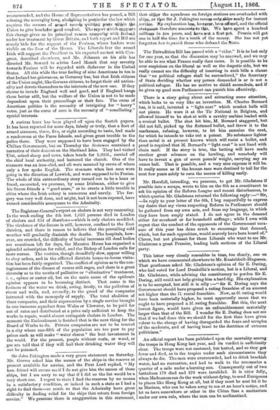The Registrar-General's report on cholera is not very reassuring. In
the week ending the 4th inst. 1,053 persons died in London of cholera and 354 of diarrhoea—which is only cholera modified. The virulence of the disease is still, however, confined to the East districts, and there is reason to believe that the prevailing cold weather will gradually diminish the deaths. The hospitals, how- ever, are crowded, the difficulty of burial increases till dead bodies are sometimes left for days, the Mansion House has organized a splendid subscription for relief, and the Bishop of London calls for more nurses. The vestries, though dreadfully slow, appear willing to obey orders, and in the afflicted districts house-to-house visita- tion has been fairly organized. The conflict of opinion as to the con- tagiousness of the disease of course still rages, and there is a great diversity as to the merits of palliative or " eliminative" treatment, i. e., opium or castor oil, but on the main cause of the epidemic opinion appears to be becoming distinct. That cause is the foulness of the water we drink, owing, firstly, to the pollution of rivers and wells, and, secondly, to the greed of the companies intrusted with the monopoly of supply. The total abolition of these companies, and their supersession by a single service brought in one immense aqueduct from Wales or Ulswater, to be paid for out of rates and distributed at a price only sufficient to keep the works in repair, would almost extinguish cholera in London. The moment the Embankment is finished that is the next thing for the Board of Works to do. Private companies, are not to be trusted in a city where one-fifth of the population are too poor to pay prices such as will make "water shares " the best investment in the world. For the present, people without coals, or wood, or gas are told that if they will boil their drinking water they will not be poisoned.






























 Previous page
Previous page